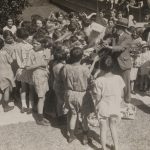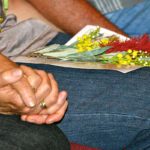Our readers might be interested in a book by Tanya Evans – Fractured Families: life on the margins in colonial New South Wales (2015, UNSW Press). Launched last week at the State Library of New South Wales, the book draws on the archives of The Benevolent Society (founded in 1813) to tell the stories of the ‘ordinary as well as the extraordinary’ people who lived and worked in colonial Sydney. People whose lives were affected by poverty, ‘illegitimacy’, unemployment and institutionalisation leave different traces in the historical record, and finding these traces to put the pieces together requires particular skills and knowledge.

As well as archival research, Evans’ methodology involves collaboration with family historians, many of whom are descendants of former clients of the Benevolent Society. For example, Evans reconstructs the stories of Sarah and William White, who migrated to Australia from Kent in 1874, by working together with descendants of this brother and sister. Genealogist Anne Coote, a descendant of Sarah, talks about ‘the thrill of the chase’ in family history, and her ‘rather guilty pleasure in uncovering the secrets some of them tried so very hard to hide’ (p.201).
While William became prosperous and well-known in Sydney, running a successful bakery business, and contributing to the Baptist community, Sarah followed a very different path through Sydney society, giving birth to 3 children at the Benevolent Asylum in Sydney between 1877 and 1882. The story of these siblings that emerges in Fractured Families is complex and nuanced, and challenges the stereotypes of the ‘fallen woman’ and the moralistic philanthropist. Evans writes that Sarah’s ‘paper trail reveals the ways in which Sarah played the system in order to receive optimal care and support, and how her very religious family … seemed to tolerate (if not condone) her misfortunes’ (p.200).
Evans has written in the past about the ‘radical potential‘ of bringing academic historians and family historians together, to uncover new historical understandings of family, class and power relations. Fractured Families is the result of a project built on collaboration and the concept of ‘shared authority‘ (a term coined by Michael Frisch in 1990, and usually associated with the practice of oral history).
The idea of shared authority also underpinned the research and content development work of the Find & Connect state-based historians (this dedicated team, spread all across the country, worked intensively on the website from 2011 to 2014). For this project, shared authority meant recognising the expertise of non-academic historians and acknowledging the immense contribution they make to public knowledge.1 Our project also is founded on respect for the people who lived the histories we were trying to document on the Find & Connect website. Two members of our team, Shurlee Swain and Debra Rosser, reflected on this in 2013, describing ‘shared authority’ as ‘not a top down or benevolent model but rather one of standing alongside and learning from each other, recognising complementary skills and knowledge sets’.
The history of the institutional ‘care’ of children is in a process of being rewritten, with the wealth of historical sources becoming accessible to researchers, and the increasing number of accounts (memoirs, oral histories, testimony, memorials, blogs, exhibitions, community history projects) that provide the perspectives of the people who lived in these institutions. The Find & Connect website is about linking all of these resources to bring about new understandings of this history.
1. For more about the Find & Connect web resource project and its methodology, see also Swain, Shurlee, ‘Stakeholders as Subjects: The Role of Historians in the Development of Australia’s Find & Connect Web Resource,’ The Public Historian, Vol. 36, No. 4, 2014, pp.38-50. DOI: 10.1525/tph.2014.36.4.38.






Frank Golding
June 24, 2015 6:54 pmA great review, Cate. Makes me want to rush out and get my hands on a copy of the book. Why has it taken so long for academic historians to see the value of working with family historians? I hope it doesn’t take as long to see the value of working with Care Leavers as memoirists.